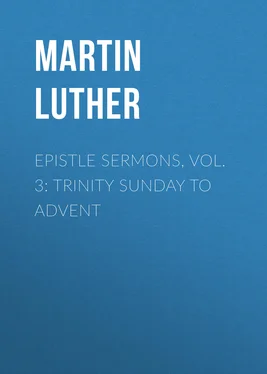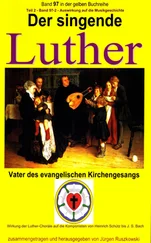Martin Luther - Epistle Sermons, Vol. 3 - Trinity Sunday to Advent
Здесь есть возможность читать онлайн «Martin Luther - Epistle Sermons, Vol. 3 - Trinity Sunday to Advent» — ознакомительный отрывок электронной книги совершенно бесплатно, а после прочтения отрывка купить полную версию. В некоторых случаях можно слушать аудио, скачать через торрент в формате fb2 и присутствует краткое содержание. Жанр: foreign_prose, foreign_religion, Философия, foreign_psychology, foreign_antique, на немецком языке. Описание произведения, (предисловие) а так же отзывы посетителей доступны на портале библиотеки ЛибКат.
- Название:Epistle Sermons, Vol. 3: Trinity Sunday to Advent
- Автор:
- Жанр:
- Год:неизвестен
- ISBN:нет данных
- Рейтинг книги:5 / 5. Голосов: 1
-
Избранное:Добавить в избранное
- Отзывы:
-
Ваша оценка:
- 100
- 1
- 2
- 3
- 4
- 5
Epistle Sermons, Vol. 3: Trinity Sunday to Advent: краткое содержание, описание и аннотация
Предлагаем к чтению аннотацию, описание, краткое содержание или предисловие (зависит от того, что написал сам автор книги «Epistle Sermons, Vol. 3: Trinity Sunday to Advent»). Если вы не нашли необходимую информацию о книге — напишите в комментариях, мы постараемся отыскать её.
Epistle Sermons, Vol. 3: Trinity Sunday to Advent — читать онлайн ознакомительный отрывок
Ниже представлен текст книги, разбитый по страницам. Система сохранения места последней прочитанной страницы, позволяет с удобством читать онлайн бесплатно книгу «Epistle Sermons, Vol. 3: Trinity Sunday to Advent», без необходимости каждый раз заново искать на чём Вы остановились. Поставьте закладку, и сможете в любой момент перейти на страницу, на которой закончили чтение.
Интервал:
Закладка:
11. We have now shown how pride conflicts with the demands of the first table of the law. Men do not employ the spiritual treasures and gifts to God's honor nor to the good of their neighbors. Thus they mar these gifts and, in their wicked course, go to the devil, into whose likeness they have grown.
PRIDE OPPOSED TO THE SECOND TABLE
12. Further, this vice is just as general in the sphere of the second table of the law—among the common people and in the temporal life of the world, each one boasting of himself and despising others. Prince and nobleman think that all the world is nothing in comparison with themselves. Commoner and peasant, puffed up because they have much wealth, imagine they must defy everybody, and do good to nobody. These deserve to be spit upon by all men. Such pride does not become them better than ornaments of gold or silver would become an image of stone or a wooden block. Finally, the women, with their foolish pride of dress, must not be forgotten. One prides herself on being better or more beautifully adorned than her neighbor. She is, in truth, a finely decorated goose. She imagines that no other woman equals her. Yea, there is scarcely a house-servant or maid but brags over others.
13. In short, we have come to the point where all men, with their insolence and boastfulness, seek to lord it over others. None will humble himself to another. Each thinks he has full right to act as he does, and is under no obligation to yield to others. And the civil government has grown so weak that there is no hope of restraining the haughtiness of all classes, from the highest to the lowest. At last, God must strike with thunder and lightning to prove to us that he resists such people and will not tolerate pride. Therefore the young, who can still be led, should be exhorted and trained, as far as possible, to guard themselves against this vice.
14. Peter uses for his purpose a peculiar term when he says, "Gird yourselves with humility." "Gird" has the meaning of being bound or joined together most firmly; or, as a garment, most carefully woven through and through so that it cannot tear. He illustrates by this term how Christians, with all diligence, should strive after the virtue, and manifest and practice it among themselves, as if upon them as a band it was a special obligation. Thus, he says, must you be twined together and bound to each other, and your hands clasped together. So must you be joined by humility, which cannot be dissolved, dismembered, or torn, even though occasion be given one, here and there, incited by the devil, or the evil word of someone else, to fly into a passion, and grow defiant and boastful, as if to say: Must I suffer such things at the hands of this man? But rather say to yourselves. We are Christians, and must bear with each other and yield, in many things; for we are all one body, and we are placed together here on earth for the sole reason that we may, through love, serve one another.
15. And each should recognize his own weakness. He should remember that God has given others also something and can give them yet more, and that therefore he should gladly serve and yield to others, remembering that he needs their help. Each one is created for the sake of others, and we are all to serve one another. God gives the same grace and salvation to all, so that none may exalt himself above his neighbor; or, if he lift himself up, that he lose the grace conferred and fall into deeper condemnation. Therefore we must hold fast to this humility, so that the unity may not be destroyed. For Satan seeks to destroy this also, and uses every possible means to lead people to despise each other and to be proud and insolent in their treatment of each other. And these are things to which flesh and blood, even without special incitement, are inclined. Thus humility is easily and quickly lost if men are not alert to fight against the devil and their own flesh.
THE BEAUTY OF HUMILITY
16. Humility is one of the beautiful garments and ornaments with which Christians should adorn themselves before God and the world. Paul, in Colossians 3, 12, says, "Put on humility." He regards this virtue as more precious than all earthly crowns and splendor. This is the true spiritual life. It is not to be sought elsewhere, by running into the cloisters or the deserts, by putting on gray gown or cowl. Peter here admonishes all classes to cultivate this virtue. This sermon on good works concerns every station in every house, city or village. It is for all churches and schools. Children, servants and the youth should be humbly obedient to parents, superiors and the aged. On the other hand, it is for those in the higher stations of life who serve their inferiors, even the lowest. If all men so observed this virtue the world would be full of good works. For it is impossible that humility should do evil. It is profitable and pleasant to all men.
17. By this virtue, true saints and Christians can better be known than by monastic seclusion and holiness. It requires no great effort to wear a gray cowl. It is not even such a great trial to lie on the ground at night and to arise at midnight; scoundrels, thieves, and murderers must often do the same. But to wear and hold fast to this angelic garment, humility—this the world is not so willing to accept as monasticism and its works. And thus it comes to pass that flesh and blood do not strive after this holy life. Each man seeks an easy life, in which he can live to himself and need serve no one nor suffer anything at the hands of others; just as the monks have sought and chosen.
18. Peter adds to this admonition the reason: "For God resisteth the proud, but giveth grace to the humble." As I have said above, he strives to show the earnestness of God's command. The command is accompanied by a threat. He does not simply say, God punishes the proud, or God is hostile to them; but he "resisteth" them, he sets himself against them. Now, what is the pride of all men toward God? Not so much as a poor, empty bubble. Their pride puffs itself up and distends itself as though it would storm the sky and contend against the lightning and thunder, that can shatter heaven and earth. What can the combined might of all creatures accomplish if God oppose himself thereto? And how does a miserable man, whose heart is overwhelmed by a small pestilence, rise against the majesty of heaven which can, any moment, cast him down into the abyss? What are earth and ashes proud of? says Sirach, 10, 9.
19. Is it not enough and more than enough that other sin and disobedience are laid to our account, by which we anger God and merit heavy punishment, without our trying further to provoke him with our pride and haughtiness, so that he must arise in his majesty and resist us? With other sins he can have patience, that he may exhort and incite us to repentance. But if, in hardened impenitence, we defy and oppose him, he cannot but rise up against us. Who is there that will bear it, or be able to stand, when God sets his countenance and his power against a poor man already subject, every moment, to death and the power of the devil?
THE CONSEQUENCE OF PRIDE
20. From the beginning, innumerable instances in history have proved the truth of this saying, "God resisteth the proud." They show how he has always overthrown and destroyed the proud world and has cast down the haughty, scornful kings and lords. The great king of Babylon, Nebuchadnezzar, was humbled when banished from his royal throne to the companionship of the beasts of the field and compelled to eat grass with them, Dan 4, 30ff. Again, remember how suddenly the great king Alexander was hurled down, when after the victory and good fortune God had given him, he began to grow proud, and wanted to be reverenced as a god? Again, there was King Herod Agrippa, Acts 12, 23. The proud, learned emperor Julian, a virulent mocker and persecutor of Christ, whom he had denied—how soon was he drowned in his own blood! And since then, what has become of all the proud, haughty tyrants, who proposed to oppress and crush Christianity?
Читать дальшеИнтервал:
Закладка:
Похожие книги на «Epistle Sermons, Vol. 3: Trinity Sunday to Advent»
Представляем Вашему вниманию похожие книги на «Epistle Sermons, Vol. 3: Trinity Sunday to Advent» списком для выбора. Мы отобрали схожую по названию и смыслу литературу в надежде предоставить читателям больше вариантов отыскать новые, интересные, ещё непрочитанные произведения.
Обсуждение, отзывы о книге «Epistle Sermons, Vol. 3: Trinity Sunday to Advent» и просто собственные мнения читателей. Оставьте ваши комментарии, напишите, что Вы думаете о произведении, его смысле или главных героях. Укажите что конкретно понравилось, а что нет, и почему Вы так считаете.












